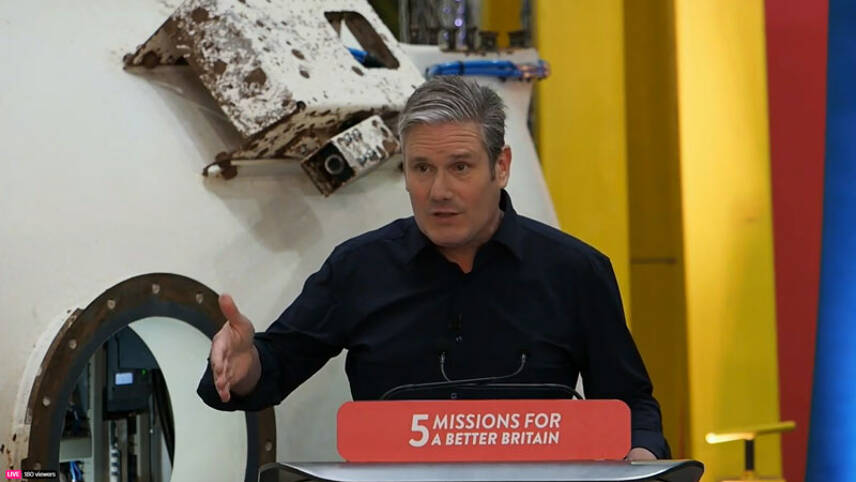Register for free and continue reading
Join our growing army of changemakers and get unlimited access to our premium content

Delivering a speech in Edinburgh this morning (19 June), Starmer outlined the key facets of his Party’s ‘Green Prosperity Plan’ for pairing levelling up and the transition to net-zero. He called doing so “the race of a lifetime” for the UK to become a low-carbon leader on the global stage.
Starmer said: “We can cut bills, create jobs, and ensure energy security for Britain… that means we need to invest.
“We’re going to throw everything at this: planning reform, procurement, long-term finance, R&D, a strategic plan for skills and supply chains. A new plan for a new settlement … all pulling together for a simple, unifying priority: British power for British jobs.”
Headline pledges from Labour include reforming the planning system for energy projects; ending legacy barriers to onshore wind development and giving all regulators binding new-zero remits with instructions to prioritise projects that enable the low-carbon transition.
Labour will also create a new publicly-owned energy generation firm, GB Energy. We already knew of this commitment but, today, Starmer confirmed that it would be based in Scotland. It could provide jobs for oil and gas workers as this sector scales back, with a new clean energy project “in every community”.
Starmer outlined plans for GB Energy to provide up to £600m to local councils, and a further £400m to community energy project organisers.
This all feeds into Labour’s commitment to end unabated fossil fuelled electricity generation by 2030, five years earlier than the Conservative Party.
On energy efficiency, Starmer promised that his party would go further and faster than the Tories on retrofitting homes, with a vision of reaching 19 million homes with upgrades this decade.
This paring of home-grown renewables and energy efficiency were framed as “essential for national security” in the climate crisis.
A death knell for oil and gas
A controversial element of the Green Prosperity Plan is an end to new oil and gas licencing. Starmer first floated this pledge earlier this month and made clear today that it will not be rowed back, despite criticism from Conservative MPs or trade bodies.
A Labour Government would honour any licences in existence at the time of the next election but would not grant licences to explore new fields beyond this point.
The International Energy Agency (IEA) has stated that ensuring that no new oil and gas exploration takes place beyond projects already in the works in 2021 is a pre-requisite for reaching global net-zero by 2050.
Trade bodies have argued that the UK should be exempt from this, as the majority of its 280+ active oil and gas fields will cease production by 2030. Moreover, Tories have accused Starmer of siding with environmental activists at Just Stop Oil and have demanded a far more detailed plan for protecting energy security and ensuring a just transition for the UK’s 200,000 oil and gas value chain workers.
Scottish Labour leader Anas Sarwar said: “There will be no cliff edge. There will be no turning off of the taps… what our industry needs is a Government that backs them, that works with them on a jobs-first transition.”
Starmer called the “good jobs for working people” in oil and gas “essential” to communities at presence, but urged the importance of creating “a bridge to a better future”.
Greenpeace UK campaigner Philip Evans said the idea that Labour’s plans would “lead to an overnight shutdown of the industry” was nonsense.Labour’s opposition to new exploration licences represented “genuine leadership” he has argued, and the party was right “to debunk scare stories being peddled by climate delayers”.
The launch of the Green Prosperity Plan follows the publication of Chris Skidmore MP’s Net-Zero Review earlier this year. The review concluded that the current Government is not implementing joined-up policy to fully realise the potential social and economic benefits of the net-zero transition.
Ministers have agreed to adopt some of Skidmore’s recommendations, but had declined to take some other key elements of the review on board – including the creation of a new cross-departmental ‘office for net-zero delivery’. This arms-length body would be responsible for holding all Departments to account and ensuring that they work in a joined-up fashion.


There is much room for zero carbon nuclear energy in our generation capacity.
But private initiative is reluctant to make such long term investments. Our present nuclear programme only exists on old government investment. But it is reliable, and zero carbon.
I watched it all in the days of the Ministry of Supply in the fifties, before even the UKAEA!
Ah me!